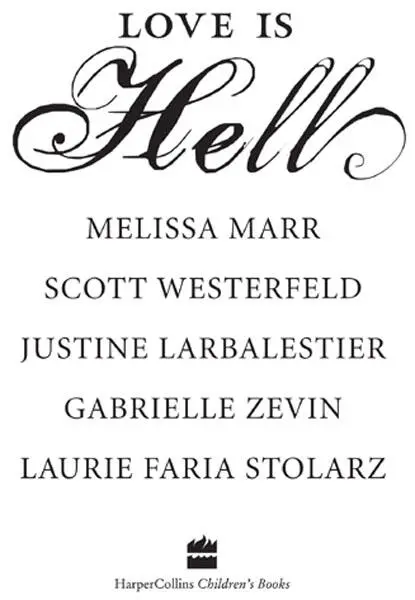
Cover
Title Page
Sleeping with the Spirit Sleeping with the Spirit
LAURIE FARIA STOLARZ Sleeping with the Spirit
One
Two
Three
Four
Five
Six
Seven
Eight
Nine
Ten
Eleven
Twelve
Stupid Perfect World
SCOTT WESTERFELD
One
Two
Three
Four
Five
Six
Seven
Eight
Nine
Thinner Than Water
JUSTINE LARBALESTIER
One
Fan Fictions
GABRIELLE ZEVIN
One
Two
Three
Four
Five
Six
Seven
Eight
Nine
Ten
Eleven
Twelve
Love Struck
MELISSA MARR
One
Copyright
About the Publisher
Sleeping with the Spirit
I WAKE UP IN a cold sweat—a sharp, biting sensation stretches down the length of my spine and makes my fingers jitter. I pull the covers around my shoulders, feeling my heart beat fast.
And noticing the ache in my wrist.
I click the reading lamp on and look down at the spot. Another soon-to-be bruise—a giant red welt that covers the front of my wrist and wraps around to the underside. So I grab the pen on my bedside table and add another point to the tally I’ve been keeping for the past two weeks since we moved here—to mark the sixth time this has happened.
Six times.
Six times that I’ve woken up with a sore spot on my body.
Six times that I’ve found myself lying awake in my bed, too terrified to fall back asleep.
Because of the voice that haunts my dreams.
Ever since we moved here, I’ve been having these weird nightmares. In them, I hear a male voice. I never see his face. It’s just his voice, whispering things that I don’t want to hear—that ghosts exist, that I need to listen to him, that he won’t let me rest until I do.
Luckily, I’m able to force myself awake. But that’s when he grips me—so hard that it leaves a mark.
I know it sounds completely crazy and at first I tried to find some logical explanation—maybe I had twisted my arm the wrong way during the night; maybe I had banged my leg on the corner of my bed or rolled over into an awkward position.
I tried to tell myself that the dreams were the result of stress—of having to move halfway across the country; of changing high schools and leaving all my friends behind. I mean, there’s bound to be a period of adjustment, right?
But now I know that it’s more than stress. Because, between the bruising and the aching, and the growing sacks underneath my eyes from lack of sleep, I feel like things are getting worse.
“Brenda?” my mother asks, standing by my bedroom door. “What are you doing up?”
I bury my wrist in the mound of covers, noticing how the smell of him—like spiced apple—still lingers in my sheets.
“You were moaning in your sleep,” she continues.
I glance at the fire-red numbers glowing on my digital clock. It’s 4:05 A.M. “A bad dream, I guess,” I say, trying to shrug it off.
She nods and plays with the belt on her robe, just lingering there in the doorway, until she finally ventures the question: “You’re not hearing voices again, are you?”
I study her face, wondering if she can handle the answer, but decide that she can’t. So I shake my head, watching her expression shift from anxiety to relief. She lets out a breath and forces a smile, still fidgeting with her robe, probably wondering about my sanity.
But that’s okay.
Because I wonder about it, too.
This isn’t the first time my parents have found me awake in the wee hours of the morning. This isn’t the first time they’ve complained about the moaning, or given me that frightened look—the one that says I’m going crazy.
Or noticed all my bruises.
The first time I got one it was around my ankle—a large purple splotch, lined with a handful of scratches. The night it happened, I went to their room, asking if they could hear the voice, too, wondering if maybe someone had broken into our house—if maybe the voice wasn’t part of a dream at all.
But my parents said no, they hadn’t heard anything. They looked particularly concerned after my father had checked things out, upon my insistence, like they were far more scared for me than with me.
“Do you want me to fix you some warm milk?” my mother asks now.
“No thanks,” I say, still able to hear the voice from my dream. It plays in my mind’s ear—a slow and rhythmic breath that pushes out the two syllables of my name over and over and over again: Bren-da, Bren-da, Bren-da .
“I just want to get back to sleep,” I lie, catching a glimpse of myself in the dresser mirror. My normally bright green eyes are troubled with veins of red. And my hair is a mess—an unruly tangle of auburn curls swooped high atop my head in a sloppy ponytail, because I can’t deal with actually having to style the high-maintenance mane.
Because I haven’t gotten a full night’s sleep since we moved here.
“Good night, Mom,” I whisper, and lie back on my pillow to appease her, so she’ll go back to bed. I pull the covers up over my ears and silently hum a little tune inside my head, in hopes that it will calm me down.
In hopes that it will drown out his voice.
THE FOLLOWING DAY AT school, Monsieur DuBois, my French teacher, pairs us all up to do a role-playing exercise. I’ve dubbed myself Isabelle, while Raina, my partner, is Marie-Claire. We begin by chatting about our hobbies and school schedules and then, when Monsieur seems far too preoccupied as he hangs pictures on the wall of various types of French cheese—and Raina and I have reached the limits of our French vocabulary—she tells me (in English) that last year, mid-December, right before the sophomore semiformal, she was the new kid, too.
“It seriously sucks having to leave your whole life behind,” she says, weaving her espresso-dark hair into a long, thick braid at the side of her head.
I nod, thinking about my friends back home, wondering what they’re doing right now.
And if they’re missing me, too.
“So, I notice you haven’t really been hanging with anyone,” Raina continues. “I saw you sitting by yourself in the cafeteria the other day. That’s social suicide, you know. If left untreated, it can lead to social roadkill.”
“Roadkill?”
She nods, still braiding her hair, trying to get all the layers woven in, despite the plethora of barrettes she’s got adorning the top of her head. “It’s a killer for the social life—sets you up for the rest of your high school career, especially being midyear, you know. Everybody’s already cliqued-off.”
“Cliqued-off?”
“Yeah,” she says, her brown eyes bulging slightly like it comes as a big, fat shock that I don’t quite get her lingo—especially since we’re both supposedly speaking in our native tongue now. “Everybody’s already settled into their cliques,” she explains. “People will see you as a loner. I mean, unless you want to be alone. .nbsp;.nbsp;”
“I hadn’t exactly given it much thought.”
“Well, you should ,” she says. “Because there isn’t much time.”
I feel my face scrunch, as clueless to her philosophy as I am to her vocabulary.
“Want my opinion?” she asks.
Читать дальше













